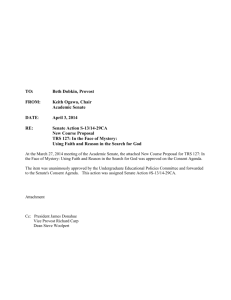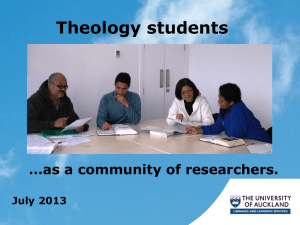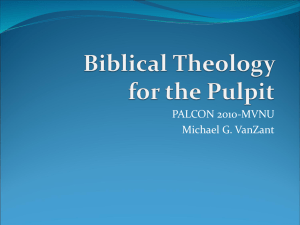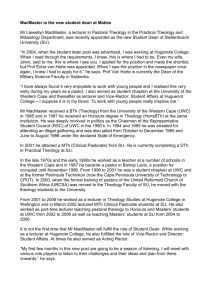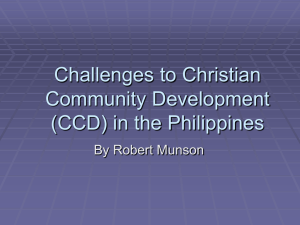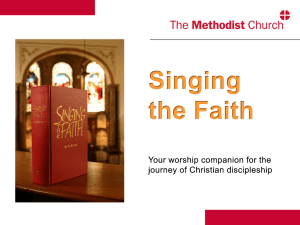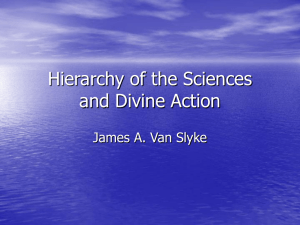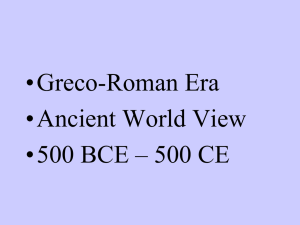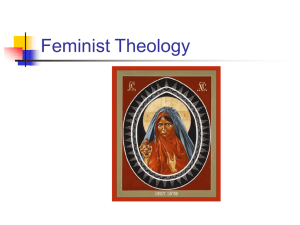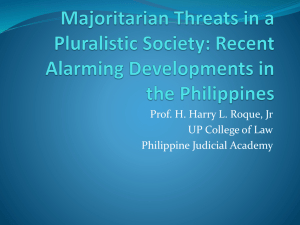Proposal - Saint Mary`s College of California
advertisement
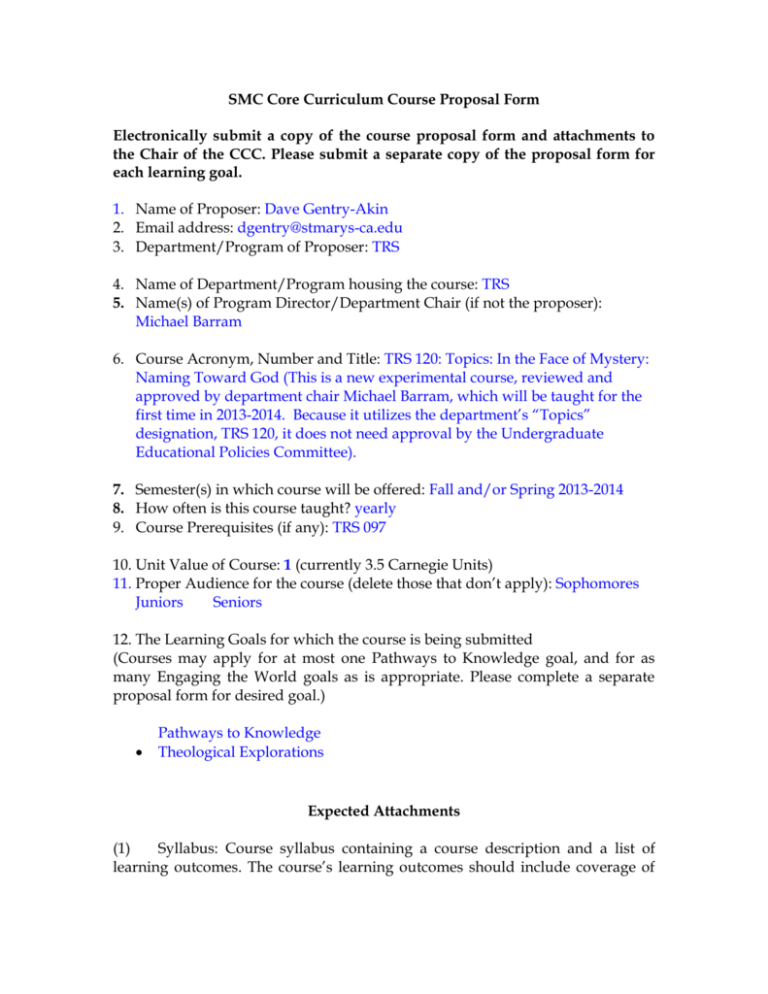
SMC Core Curriculum Course Proposal Form Electronically submit a copy of the course proposal form and attachments to the Chair of the CCC. Please submit a separate copy of the proposal form for each learning goal. 1. Name of Proposer: Dave Gentry-Akin 2. Email address: dgentry@stmarys-ca.edu 3. Department/Program of Proposer: TRS 4. Name of Department/Program housing the course: TRS 5. Name(s) of Program Director/Department Chair (if not the proposer): Michael Barram 6. Course Acronym, Number and Title: TRS 120: Topics: In the Face of Mystery: Naming Toward God (This is a new experimental course, reviewed and approved by department chair Michael Barram, which will be taught for the first time in 2013-2014. Because it utilizes the department’s “Topics” designation, TRS 120, it does not need approval by the Undergraduate Educational Policies Committee). 7. Semester(s) in which course will be offered: Fall and/or Spring 2013-2014 8. How often is this course taught? yearly 9. Course Prerequisites (if any): TRS 097 10. Unit Value of Course: 1 (currently 3.5 Carnegie Units) 11. Proper Audience for the course (delete those that don’t apply): Sophomores Juniors Seniors 12. The Learning Goals for which the course is being submitted (Courses may apply for at most one Pathways to Knowledge goal, and for as many Engaging the World goals as is appropriate. Please complete a separate proposal form for desired goal.) Pathways to Knowledge Theological Explorations Expected Attachments (1) Syllabus: Course syllabus containing a course description and a list of learning outcomes. The course’s learning outcomes should include coverage of the Learning Outcomes associated with the Core Curriculum Learning Goal for which the course is being proposed. (2) Teaching: A brief narrative (300 words) that explains how the course will guide students toward achieving the Learning Goal. The CCC believes it would be simplest both for the proposer and for the Working Groups if the narrative addressed the Learning Outcomes one by one. (3) Learning: A brief explanation of how coursework (e.g., papers, exams, videotaped presentations) will be used to measure student achievement of each of the Learning Outcomes. Please address the outcomes directly and one by one. 1. Syllabus follows below. 2. Teaching and Learning: 2.1. Students should demonstrate an understanding of one or more aspects of Christian tradition and/ or another religious tradition or traditions, acquired through focused study in a sub-field of theology or religious studies. 2.1.1.Teaching: This course, “In The Face of Mystery”, deals with some of the “foundational” questions in the sub-field of Systematic Theology, within the wider field of Roman Catholic Theology, a recognized branch of the Christian Tradition. 1 “Systematic Theology”, as opposed to Biblical Studies or Christian Ethics, for example, engages in reflection on the core themes and ideas of Christian revelation, using not only the sacred scriptures, but also the writings of the Fathers and Mothers of the Church, the dogmatic definitions of ecumenical councils, and the teaching of the popes and the magisterium of the Church. These ecclesiastical sources are brought into dialogue with contemporary culture and experience using philosophical tools and methods. The ultimate goal of “systematic” theology is to make the Christian faith intelligible and logically tenable to the contemporary seeker of truth. In particular, it seeks to help believers better understand their own belief by helping them to bring to bear the wisdom of the Church and the academy with the use of reason and reflection on their own lived experience. This course consists of a focused study of the following foundational questions: methods to be used, the nature of faith and revelation, and the Catholic Christian understanding of God and the Trinity. 2.1.2. Learning: There are fourteen (14) learning outcomes for this course, articulated in the syllabus below. Each of the weekly quizzes, as well as the research paper and the final 1 Other recognized branches of systematic theology include method, the question of faith and revelation, the nature of God, the doctrine of the Trinity, the nature of Jesus Christ, the Church, sin and grace, Mary and the communion of saints, the sacraments, and eschatology. exam, are correlated with these fourteen learning outcomes, giving the student explicit opportunities to demonstrate her or his mastery of a particular learning outcome. 2.2. Students should demonstrate an ability to explore religious questions from a believer’s point of reference and from the critical perspective of the academy. 2.2.1. Teaching: By its very nature, Roman Catholic theology is “faith seeking understanding”. As such, it understands both “faith” and “reason” to be ‘ways of knowing”, two different ways—brought into correlation through the use of a particular theological method—of more deeply understanding God, the world, others, ourselves, and our place in the world. Put simplistically, “faith” might be called the domain of the Church, and “reason” might be called the domain of the academy (though contemporary epistemology has demonstrated that a kind of “faith” is also at work in the scientific method, and theologians are certainly using the tools of reason in their theological explorations. In this sense, the dichotomy between “belief” and “critical perspective of the academy” is an artificial one, since believers are to be found among the members of the academy, and since bringing critical questions to faith is at the heart of any serious theological method). Thus, systematic theology is always moving back and forth between explicit theological sources (the Bible, dogmatic definitions, papal teaching, etc.) and the critical questions raised by human reason and experience (what is referred to in the learning outcome as the “critical perspective of the academy”). This course in particular relates Biblical and ecclesial teaching about Creation to the challenges and insights coming forth from contemporary science, a field that is populated by people of faith as well as by people for whom faith is not a consideration. 2.2.2. Learning: There are fourteen (14) learning outcomes for this course, articulated in the syllabus below. Each of the weekly quizzes, as well as the research paper and the final exam, are correlated with these fourteen learning outcomes, giving the student explicit opportunities to demonstrate her or his mastery of a particular learning outcome. Any course approved for the core must provide data for the assessment of Core curriculum learning goals at an institutional level. Via this proposal a chair/program director agrees to oversee the submission of the student work necessary for the assessment of the learning goals. If the proposal is from an instructor, that individual agrees to oversee submission of work from appropriate sections of their course. Similarly, while courses, and individual sections within courses, may vary, the Core should provide somewhat consistent experiences within each Learning Goal. To this end, by submitting this proposal a chair/program director/instructor agrees that instructors of Core courses will participate in assessment exercises. TRS 120: Topics In the Face of Mystery: Naming Toward God Dave Gentry-Akin, M. Div., STL, STD Department of Theology & Religious Studies Saint Mary’s College of California Course Description: “Theology”, quite simply, means “thinking about God”. Coming from two Greek roots, “theos”, meaning “God”, and “logos” meaning “a word about”, theology is “a word [or words] about God”, the attempt to think, logically and systematically, about who God is and how God relates to our world. In the Catholic tradition, following Saint Anselm of Canterbury (1033-1109), we understand theology as fides quarens intellectum, or “faith seeking understanding”. Thus, faith and reason are, for the Catholic intellectual, integrally related as two sources for coming to know about God. As Blessed Pope John Paul II writes in his encyclical, Fides et Ratio, “Faith and reason are like two wings on which the human spirit rises to the contemplation of truth; and God has placed in the human heart a desire to know the truth—in a word, to know Godself—so that, by knowing and loving God, men and women may also come to the fullness of truth about themselves.” So the journey of understanding God is also intrinsically related to the search for truth, the search to understand the mystery of the human person, and, ultimately, the search for selfunderstanding. This course will explore these ideas in a thoughtful and systematic way using the methods and sources of the Catholic intellectual tradition. As such, this course is intentionally designed to meet the learning outcomes for an upper division course in the learning goal of the SMC goal curriculum for “Theological Understanding”: 1) the course will consist of “focused study in a subfield of theology”, namely, some of the questions surrounding method, the nature of revelation, God, and Trinity from within the broad field of Roman Catholic systematic theology, and 2) students will explore profound religious questions from both an “existential”, or “believer’s frame of reference” as well as one that fully employs the scholarly tools for criticism and analysis that a part of the academic discipline of Roman Catholic theology. Learning Outcomes: At end of this course, students will be able to: 1. define the term “theology” as understood in the Roman Catholic context. 2. identify the key sources of theology in Roman Catholicism (the Bible, the Fathers of the Church, the teachings of ecumenical councils and popes, the writings of theologians). 3. describe three classic paradigms of theology (Augustine, Aquinas, and Neo-Scholasticism) and analyze the strengths and limitations of each paradigm. 4. identify and critique five contemporary approaches to theology (transcendental, hermeneutical, analytical, correlational, liberationist) 5. identify five critiques of classical theology posed by intellectual movements of the Twentieth Century and analyze their claims. 6. Define the concept of “Revelation” as understood in Catholic thought 7. identify the concept of faith, distinguish the difference between faith and knowledge, and describe the properties of faith 8. explain the notion of “Tradition” as a source of doctrine 9. explain the concept of the “magisterium” and compare and contrast the difference between teaching understood to be “infallible” and teaching which is not so understood 10. describe the relationship between God and Christ as understood in Catholic theology 11. define the concept of “natural theology” and compare and contrast this concept to that of “revelation” 12. distinguish among various classical ways of conceiving of God, e.g. Deism, Theism, Panentheism, and assess the strengths and limitations of each model. 13. articulate the Christian understanding of the Triune God and how the persons of the Trinity are similar to and distinct from one another. 14. articulate some ways in which the doctrine of the Trinity has been received in our contemporary context and compare and contrast those to more classical ways of understanding the Trinity. Means of Assessment: Weekly quizzes Midterm and Final Exam One paper of 8-10 pages in which the student will be asked to choose a 20th century Roman Catholic theologian from an approved list. The student will research this theologian, placing her or him in the context of 20th century theological developments and movements, and appraise the contributions, strengths, and limitations of this theologian’s thought. Possible texts Starred texts would most likely be used in their entirety, while chapters would be drawn from among the other listed texts. Other texts may be substituted depending upon what is available at the time that this course is taught (Fall 2013). Buckley, Michael J. At the Origins of Modern Atheism. New Haven: Yale University Press, 1987. Burrell, David. Knowing the Unknowable God. Notre Dame, IN: University of Notre Dame Press, 1986. Congar, Yves. “The Meaning of Tradition”, Sec. 1 vol. 3 of Twentieth Century Encyclopedia of Catholicism. New York: Hawthorn, 1964. Dulles, Avery. Models of Revelation. Garden City, NY: Doubleday, 1983.* Johnson, Elizabeth A. She Who Is: The Mystery of God in Feminist Theological Discourse. New York: Crossroad, 2002. Jones, Serene and Paul Lakeland, eds. Constructive Theology: A Contemporary Approach to Classical Themes. Minneapolis: Fortress Press, 2005. Kaufman, Gordon. God the Problem. Cambridge: Harvard University Press, 1972. LaCugna, Catherine Mowry. God For Us: The Trinity and Christian Life. San Francisco: HarperCollins, 1991.* Lonergan, Bernard. Method in Theology. New York: Crossroad, 1972. McFague, Sallie. Models of God: Theology for an Ecological, Nuclear Age. Minneapolis: Fortress Press, 1987. Moltmann, Jürgen. The Trinity and the Kingdom: The Doctrine of God. New York: Harper and Row, 1981. Murray, John Courtney. The Problem of God. New Haven: Yale University Press, 1964.* Rahner, Karl. Foundations of Christian Faith. New York: Crossroad, 1982. Schüssler Fiorenza, Francis and John P. Galvin, eds. Systematic Theology: Roman Catholic Perspectives. Second edition. Minneapolis: Fortress Press, 2011.
